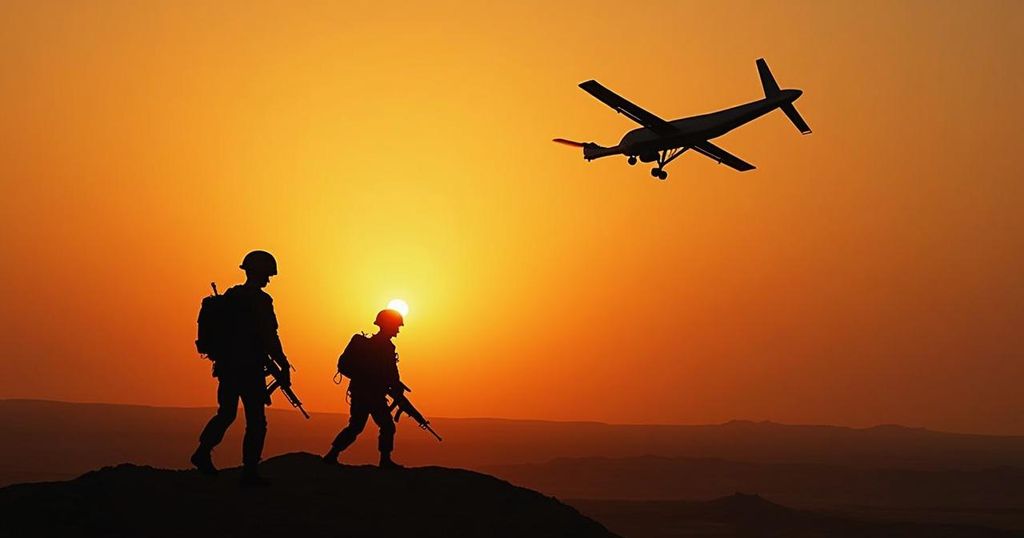Escalating Tensions: Israeli Soldiers Killed in Drone Strike from Iraq
Two Israeli soldiers were killed in a drone attack from Iraq, confirmed by the IDF, amidst escalating tensions in the region. The Islamic Resistance in Iraq claimed responsibility, though the verification of this linkage remains pending. Concurrently, Iran’s Supreme Leader justified previous attacks on Israel while the U.S. military engaged in retaliatory airstrikes against Houthi forces in Yemen. The conflict reflects heightened regional hostilities and a critical humanitarian crisis.
On Friday, the Israel Defense Forces (IDF) confirmed the deaths of two Israeli soldiers due to a drone strike originating from Iraq. The soldiers, who were positioned at a military base in northern Israel, fell victim to this attack. The drone strikes were claimed by the Islamic Resistance in Iraq, an Iran-affiliated group, which asserted responsibility for targeting three specific locations in Israel, although it remains unverified whether these strikes were indeed the cause of the soldiers’ deaths. This incident occurs in the context of rising hostilities in the region, marked particularly by Israel’s ongoing ground operations against Hezbollah in Lebanon, which have reportedly resulted in significant casualties, including over 100 fatalities within a single day. Iran’s Supreme Leader, Ayatollah Ali Khamenei, characterized the attacks on October 7—which resulted in the losses of over 1,200 Israeli lives—as justified retribution and amplified anti-Israel rhetoric during a public sermon. He insisted that the sacrifices made by those resisting against Israel in nations like Lebanon and Palestine should bolster their resolve rather than diminish it. Amidst this mounting conflict, the United States military conducted air strikes targeting Houthi positions in Yemen as retaliation for various provocations. Within the same breadth of violence, the IDF reported that at least two additional soldiers were severely wounded during the drone strike, continuing a trend of increased military engagement and significant fatalities among Israeli personnel as the ground incursion into southern Lebanon intensifies. Overall, the situation remains precarious, underscored by Iran’s firm backing of its regional allies and a complex tapestry of hostilities benefitting neither side.
The current conflict between Israel and Iran-backed factions epitomizes a significant geopolitical crisis in the Middle East. Tensions have escalated dramatically following attacks attributed to Iranian-affiliated groups and Israel’s defensive operations against Hezbollah, particularly following the inflating violence from October 7, 2023. The recent attacks underscore the broader dilemma of regional security where multiple states and non-state actors are engaged in viscerally contentious confrontations, compounded by reciprocal threats and military actions. The implications of this violence traverse national borders, warranting collective international concern over humanitarian impacts and potential global repercussions, including disruptions in oil supply chains due to military actions targeting facilities in Iran.
The drone strike that resulted in the deaths of two Israeli soldiers represents a critical juncture in the ongoing military confrontations in the Middle East. With escalating conflicts involving Iran, its proxies, and Israel, along with international responses such as U.S. military actions against Houthi targets in Yemen, the situation on the ground grows increasingly precarious. Khamenei’s rhetoric coupled with recent military operations foreshadows a potentially broader conflict, further complicating the delicate balance of power in the region. The unfolding events emphasize the urgent need for diplomatic efforts to prevent further loss of life and restore stability in the area.
Original Source: www.newsweek.com




Post Comment